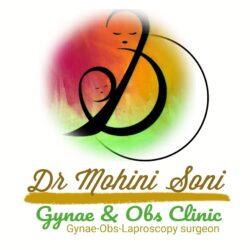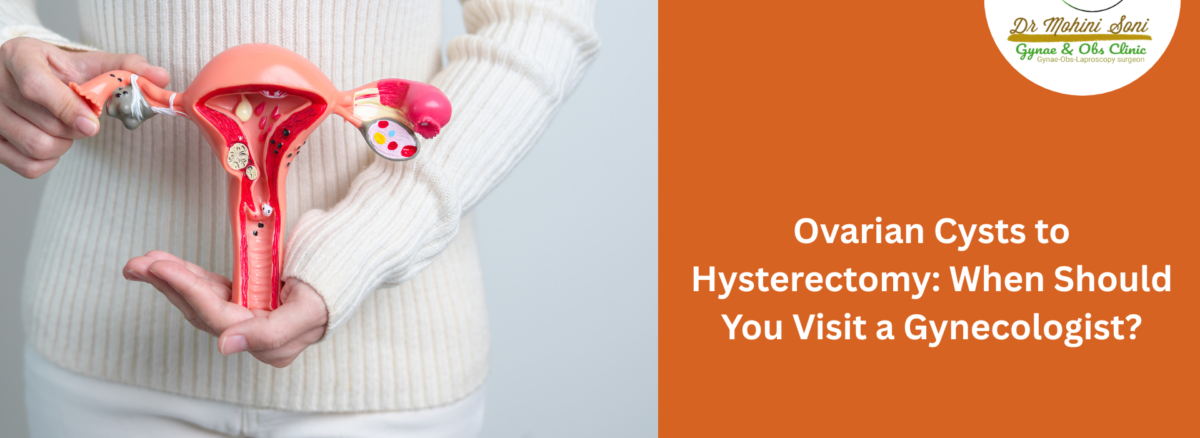Ovarian cyst When it comes to women’s health, many symptoms are often ignored or passed off as “normal.” But persistent pain, irregular periods, or discomfort could be signs that something more serious-like an ovarian cyst or fibroids-is going on. Visiting a gynecologist at the right time can help detect and manage these conditions before they affect your quality of life.
From monitoring ovarian cysts to recommending procedures like myomectomy or hysterectomy, a gynecologist plays a key role in a woman’s reproductive health. Let’s explore when you should seek help and what treatment options might be considered.
What Are Ovarian Cysts?
Ovarian cysts are fluid-filled sacs that form on or inside an ovary. Most cysts are harmless and go away on their own. However, some can grow larger, cause pain, or lead to complications like rupture or twisting (torsion).
Common symptoms of ovarian cysts include:
- Pelvic pain or pressure
- Bloating or fullness in the abdomen
- Pain during or after intercourse
- Irregular menstrual cycles
- Difficulty in emptying the bladder or bowel
If you experience any of these symptoms, it’s time to consult a gynecologist for proper diagnosis and management.
When Is Surgery Like Myomectomy or Hysterectomy Needed?
Not all gynecological problems require surgery. However, if you have fibroids, heavy bleeding, pelvic pain, or chronic infections, your doctor may recommend procedures like:
Myomectomy:
This is the surgical removal of uterine fibroids. It is suitable for women who wish to preserve their uterus and plan a future pregnancy.
Hysterectomy:
This is the removal of the uterus and is considered when other treatments fail or when there are recurring fibroids, severe bleeding, endometriosis, or certain types of cancer. It’s a more permanent solution and is usually recommended after careful evaluation.
When Should You Visit a Gynecologist?
Here are some signs that indicate it’s time to schedule an appointment:
- Ongoing lower abdominal pain or pressure
- Unusual vaginal discharge or bleeding
- Painful or irregular periods
- Bleeding after menopause
- Fertility issues or frequent miscarriages
- Family history of gynecological disorders
- Early consultation ensures timely treatment and better outcomes.
The Role of a Gynecologist in Treatment Decisions
A skilled gynecologist not only diagnoses the problem but also helps you understand your condition and guides you through the best treatment plan based on your age, symptoms, fertility goals, and health history. Whether it’s managing a simple cyst or choosing between myomectomy and hysterectomy, personalized care is essential.
Conclusion
Your reproductive health is too important to ignore. If you’re dealing with symptoms like pelvic pain, irregular bleeding, or have been diagnosed with ovarian cysts or fibroids, don’t wait. An experienced gynecologist in Vasant Kunj, Delhi can help you get the right diagnosis and guide you through your options-whether it’s watchful waiting or considering procedures like myomectomy or hysterectomy.
Early care leads to better health outcomes. Don’t hesitate to take that first step toward wellness.
FAQs
- Are all ovarian cysts dangerous?
No, most ovarian cysts are harmless and resolve without treatment. However, some cysts can grow large or cause complications and should be monitored by a gynecologist. - Can fibroids be treated without surgery?
Yes, small or asymptomatic fibroids can often be managed with medication. Surgery like myomectomy is only advised when fibroids cause significant problems like heavy bleeding or infertility. - What’s the difference between myomectomy and hysterectomy?
A myomectomy removes fibroids while keeping the uterus intact, making it suitable for women who want children. A hysterectomy removes the uterus and is a more permanent solution for severe or recurring conditions. - How long is the recovery after a hysterectomy?
Recovery time depends on the type of hysterectomy performed. Minimally invasive procedures may take 2-4 weeks, while abdominal hysterectomy might require 6-8 weeks of recovery. - How often should I visit a gynecologist?
It’s advisable to visit a gynecologist annually for a general check-up or sooner if you notice any unusual symptoms like pain, irregular bleeding, or discharge.

